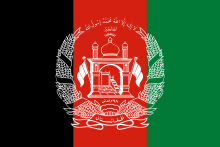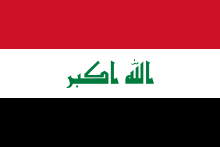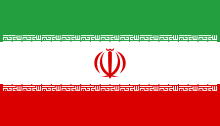Takbir
![]()
Allahu Akbar is a redirect to this article. For the former national anthem of Libya, also referred to by this expression, see Allahu Akbar (national anthem of Libya).
Takbīr (Arabic تَكْبِير) is a verbal noun of the Arabic verb kabbara meaning "to say Allahu akbar" (الله أَكْبَر, DMG allāhu akbar 'God is greatest'). This formula is used very frequently in Islam.
Allah is the Arabic word for 'God'. Akbar is the elative form of the adjective كبير kabīr 'great, grand; important', meaning "greater", "greatest" or "very great". In its grammatical function, the elative includes both the meaning of the comparative (greater than) and the superlative (greatest). The articular elative primarily fulfills the function as predicate or apposition to the indeterminate rain: Allāhu akbaru, i.e. God is (incomparably) great. However, the elative fulfills the function of a comparative only when combined with the preposition min. For example: Allāhu akbar min malāʾikatihi ("Allah is greater than his angels"). Otherwise, the meaning corresponds to the superlative ("greatest").
In this meaning takbīr is already documented in Sura 17 verse 111: وكبّره تكبيرا / wa-kabbirhu takbīran / 'and praise him everywhere'. See also: Sura 74, verse 3, which is one of the oldest verses in the Qur'an: وربّك فكبّر / wa-rabbaka fa-kabbir / 'And praise your Lord'.
The expression is to be said at the beginning of the daily obligatory prayers (salāt); it is called: تكبيرة الإحرام / takbīratu ʾl-iḥrām / 'takbir of consecration'. In Islamic law, this takbir is considered either as a religious duty and part of prayer or as Sunnah. During prayer, it is repeated five times. Accordingly, the phrase is also part of voluntary prayers. The call to prayer (adhān) also begins with this expression. According to tradition, Muhammad is said to have called the takbir four or five times during a funeral. It is Prophet's unnah to say takbir at various stages of pilgrimage ceremonies, at the sight of the Kaʿba, and at the end of a journey. According to some traditions, it is also Prophet's Unnah to call out "Allāhu akbar" at the sight of the new moon (hilal) at the beginning of the fasting month of Ramadan.
The phrase "Allāhu akbar" is included in the flag of Iraq, Iran and Afghanistan.
Due to the media presence of Islamist terrorism, the expression "Allahu akbar" is connoted with it, especially in the West. In fact, however, the expression is used by Muslims and also Arabic-speaking Christians and Jews in everyday life on various occasions, such as to express general joy, astonishment or dismay.

The flag of Afghanistan with the inscription Allāhu akbar above the mosque, above it the Shahāda

Allāhu akbar in the flag of Iraq

In the flag of Iran, the lettering Allahu akbar is strongly abstracted as an ornament on the red and green border.
See also
- Inshallah
- Alhamdulillah
- List of Islamic terms in Arabic
Search within the encyclopedia